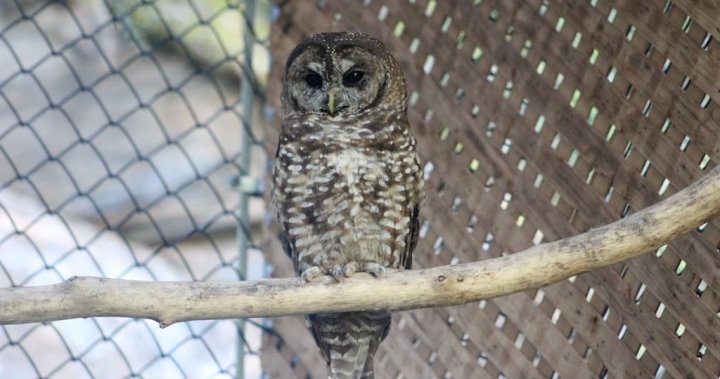
Two northern spotted owls that had been released into a British Columbia forest last year have been found dead, potentially reducing the known wild population in the province to a single female.
Spuzzum First Nation Chief James Hobart says in a joint statement issued with the government and Jasmine McCulligh, facility co-ordinator for the Northern Spotted Owl Breeding Program, that the two male birds’ remains were found with their GPS trackers in early May.
Nathan Cullen, minister of water, land and resource stewardship, says the cause of the released birds’ death is unknown, but could include physical injury, predation, disease or starvation.

Hobart calls the deaths “devastating,” and says efforts will be made to retrace the birds’ final days to work out what could have been done differently.
A third male owl that had been released with the others last August was found injured near train tracks in October after potentially colliding with a train. It has since recovered but remains in the breeding program’s facility in Langley.
McCulligh says that despite the birds’ deaths, her team would use the experience to help move the breeding and release program forward.
She says “countless hours” had been spent nurturing the owls, as she recalled the “exciting and rewarding moment” of their release near the Spuzzum First Nation, about 200 kilometres northeast of Vancouver.
“Although this is clearly not the result we had wished for, we are committed to learning as much as we can from this experience,” she says in the statement issued Friday.

McCulligh had said in February that the release of the male trio had brought the confirmed wild population to four, with a single female known to exist.
Cullen says in Friday’s statement that the government and its partners were doing everything they could to help spotted owls recover, supporting the world’s only captive breeding and release program.
Protection of spotted owls has fuelled decades-long disputes between environmental groups and the forest industry as their future is often tied to saving old-growth forests where the birds live.
When the birds were released last year, the Ministry of Land, Water and Resource Stewardship said it was a “historic milestone,” crediting a partnership between the breeding program and the Spuzzum First Nation.
© 2023 The Canadian Press
















